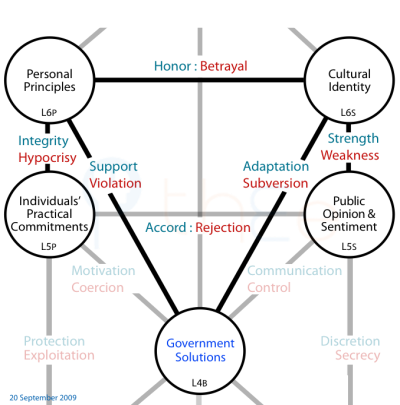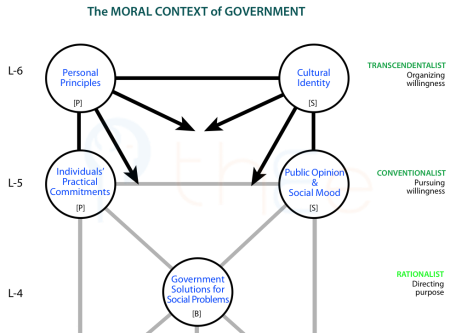Moral Influences in Politics

Transcendentalist principles operate in a world of potential apart from everyday realities. The challenge for each and all is to make them evident in everyday events. As proposed above, this occurs within persons as Integrity (CL6P ↔ CL5P), and shows in the people en masse as Strength (CL6S ↔ CL5S).
 Individuals and Society Reflect Each Other
Individuals and Society Reflect Each Other
CL6S ↔ CL6P
Cultural Identity ↔ Personal Principles
Personal principles are naturally related to the cultural identity of the society. Everyone internalizes the culture during childhood socialization and language development. In return, personal principles become the mechanism by which cultural identity is sustained in a meaningful and effective way.
A person whose principles reveal the best of the cultural identity is given Honour by society. A person whose principles undermine the culture is guilty of Betrayal. The converse applies: a person can feel betrayed by his society, and a society can be honoured by the conduct of its most distinguished individuals.
 The Old-Enduring Confronts the New-Transient
The Old-Enduring Confronts the New-Transient
CL6S ↔ CL5S
Cultural Identity ↔ Public Opinion
A cultural identity is always «the old», and is expressed in custom. Public opinion and sentiment lie in the present, and are fluid, dynamic and transient. Public opinion and mood can get out of synch with traditional requirements and manners. At some point the majority may view certain traditional beliefs as out of date and out of touch with modern problems and ways of life. If sustained, the identity is slowly remoulded as older people die off.
When the cultural identity is in synch with public opinion, society manifests Strength. When the two are out of synch, the society exhibits Weakness.
 Principles and Practicality often Conflict
Principles and Practicality often Conflict
CL6P ↔ CL5P
Cultural Identity ↔ Personal Principles
A person's principles should shape commitments at least some of the time—otherwise how can they be personal principles? The problem is that practicality may often dictate a course at variance with those principles—perhaps there are social or financial pressures that are difficult or painful to resist. Principles may get adjusted if such pressures are enduring and forceful.
The reflection of principles in commitments and vice versa is an expression of Integrity. The philosophy of «do what I say, not what I do» is recognized as Hypocrisy. It is commonly seen in politicians who passionately advocate policies as a matter of personal principle, but are then found to act differently in their private life.
 Tradition affects Government Solutions
Tradition affects Government Solutions
CL6P ↔ CL4B
Cultural Identity ↔ Government Solutions
Cultural identity and government solutions need to be inter-connected to some degree. In order to be effective, governments adapt policies to what they perceive are defining values or moral imperatives within the culture. Such Adaptation is a positive and it works in the other direction as well: solutions progressively responding to emerging social forces do alter the cultural identity. When the influence in either direction seems destructive, it is perceived as Subversion. Governments may seek to subvert the cultural values, perhaps because they experience traditions as subverting their solutions.
 Personal Principles and Government Solutions Do Interact
Personal Principles and Government Solutions Do Interact
CL6S ↔ CL4B
Personal Principles ↔ Government Solutions
Choices made by governments may fit with common personal principles and Support them, which usually activates a reciprocal backing of solutions. Alternatively, a clash emerges as solutions trample over principles and principles, in their turn, invite solutions to be ignored or rejected. This negative channel is Violation.
 Indirect Influences
Indirect Influences
While it seems obvious that personal principles interact with cultural identity; that personal principles affect individual commitments and that cultural identity affects public opinion, it is less obvious whether and how the two CL6-Centres will affect diagonally opposite CL5-Centres or Government Solutions-CL4.

However there appear to be no cross-links, i.e. cultural identity is too abstract and distant from the messy complications of everyday life to guide practical commitments; and your personal principles have almost zero chance of having any effect on public opinion and sentiments. Indirect effects can occur however e.g. culture may affect popular opinion which may affect personal commitments.
Direct links to lower Centres—officials-CL3, rule of law-CL2, power struggles-CL1—cannot occur without mediation via CL5 or CL4 Centres.
Originally posted: July 2009; Last updated: 12 June 2014.

![]() Individuals and Society Reflect Each Other
Individuals and Society Reflect Each Other
![]() The Old-Enduring Confronts the New-Transient
The Old-Enduring Confronts the New-Transient
![]() Principles and Practicality often Conflict
Principles and Practicality often Conflict
![]() Tradition affects Government Solutions
Tradition affects Government Solutions
![]() Personal Principles and Government Solutions Do Interact
Personal Principles and Government Solutions Do Interact
